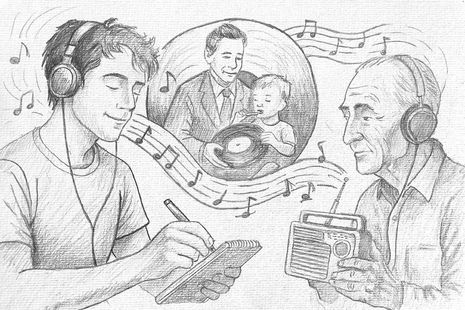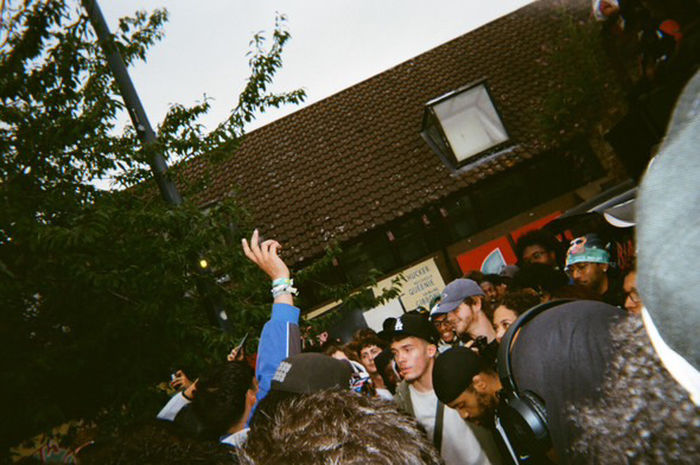Family ties and the records we inherit
Jake Harper uncovers how sampling and family listening tie generations together

My first exposure to a genre that would later transform my understanding of music came at about nine or ten years of age, introduced by my mother through the medium of Radio 6. Skee-Lo’s ‘I wish,’ a classic 90s hip-hop track, had just come on during a long road trip, hooking me on the sound and feel of alternative hip-hop and jazz rap I still love today.
In only the past few generations, tastes in popular music have emerged as a novel form of inherited trait along familial lines. Popular music has diversified and become increasingly heterogeneous since the mid-20th century, and this has enabled the intergenerational passage of specific musical preferences within the family to become almost ritualised in modern culture.
“Tastes in popular music have emerged as a novel form of inherited trait”
Some may diverge more sharply from the musical preferences of their parents in a symbolic effort to break from the constraints of the family. Others might have strayed so far from the original tracks and albums we were raised on that we find ourselves struggling to find common ground on the family car’s Bluetooth. But I think it’s hard to deny the influence, whether consciously recognised or not, that the music played around the house or in the car during adolescence has on our own tastes later in life.
One example in my own case is the music of Labi Siffre. I was first introduced to his music through my mother’s fixation with ‘I Got The…’ – a particularly slick and memorable soul track with some brilliant orchestration. You’ve almost certainly heard this one, even without realising it: anyone with a keen ear will recognise the sample used for the main groove in Eminem’s classic ‘My Name Is,’ which starts at about the 2:30 mark.
Siffre seems to have a knack for creating sample or cover-worthy music, and in a strange way the level of name recognition and success accorded to these songs seems to surpass his own. You’ll probably recognise ‘My Song’ from its prominent usage in Kanye’s ‘I Wonder.’ Likewise, the Madness hit ‘It Must Be Love’ is, in fact, a cover of a lesser-known Labi Siffre original of the same name, a fact of which far too few listeners appear aware.
One of my personal favourites from Siffre’s discography is ‘Bless the Telephone,’ a comparatively pared-back and intimate number featuring just vocals and acoustic guitar. I would imagine that anyone in some form of long-distance relationship (as many Cambridge students are) may find the lyricism particularly resonant.
“Sampling allows musical genres to transcend generations and eras of popular culture”
I’ve already touched on my first exposure to alternative hip-hop through ‘I Wish,’ which has since received renewed popularity through TikTok. I also have fond childhood memories of the music of Digable Planets, De La Soul, and Eric B. & Rakim being played around the house, especially the latter’s ’Don’t Sweat the Technique.’ The long-standing interest I have taken since in other alternative and jazz-influenced groups such as The Pharcyde, A Tribe Called Quest, and Souls of Mischief is simply an evolution of the songs I heard growing up.
Some of the songs I associate most with my teen years, such as ‘Runnin’’ or ‘93 Til’ Infinity,’ are as a really only known to me because of my parents’ interest in that genre of music, even though those groups were not introduced by them directly. As a side note, it’s also worth checking out the incredible music video for the Pharcyde’s ‘Drop,’ it’s rather creative.
Genres like hip-hop which heavily utilise sampling are at times dismissed by critics for a supposed lack of originality and creativity. Rather than being a symptom of the laziness of the music industry or even a form of theft, however, production utilising sampling offers a brilliant opportunity for talented artists to construct something new and unique out of older music, while respecting and even building upon its legacy. Especially in the case of hip-hop and pop music, it also represents a pathway for younger generations to discover and explore music from before their own time. In the same way we may inherit one cross-generational taste or another from our parents, sampling allows musical genres to transcend generations and eras of popular culture, even while trends and preferences change.
I really do believe we can see ourselves in the music our parents played in their youth, and vice versa. In the same way we might see our face or eyes in those of our parents, we can see ourselves and our efforts towards self-expression in the music they chose to soundtrack their lives even years before we were here. By sifting through old family record collections, we can discover hidden musical gems, learn about our parents’ upbringing, and maybe even learn something about ourselves. I think there’s something quite beautiful in that.
 Comment / The (Dys)functions of student politics at Cambridge19 January 2026
Comment / The (Dys)functions of student politics at Cambridge19 January 2026 Arts / Exploring Cambridge’s modernist architecture20 January 2026
Arts / Exploring Cambridge’s modernist architecture20 January 2026 Features / Exploring Cambridge’s past, present, and future18 January 2026
Features / Exploring Cambridge’s past, present, and future18 January 2026 News / Local business in trademark battle with Uni over use of ‘Cambridge’17 January 2026
News / Local business in trademark battle with Uni over use of ‘Cambridge’17 January 2026 News / Your Party protesters rally against US action in Venezuela19 January 2026
News / Your Party protesters rally against US action in Venezuela19 January 2026









